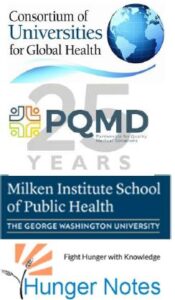Future of America’s Assistance for Global Health – Roundtable
by WHES
Hunger Notes joins with other sponsors in convening an expert discussion on July 17, 2025 about the role of American foreign aid in global health, looking ahead 5+ years. The Consortium of Universities for Global Health, the Partnership for Quality Medical Donations, the World Hunger Education Service, and George Washington University’s Milken Institute School of Public Health are organizing an online (Zoom) roundtable conversation of American public health professionals about how future United States foreign assistance can best promote global health in least developed countries.
It asks about the ongoing battle against the risks of death and illness among children in many lesser developed countries, but also what are new risks that may become disease priorities? Neglected tropical diseases or pandemics?
What American research is making a difference or will be in solving emerging problems? Where are emerging gaps? Should U.S. government aid target pneumonia, measles, tuberculosis, malaria, HIV/AIDS, malnutrition or which other priorities?

What are new opportunities for partnerships? Which new technologies from America will make a difference? What are the best roles for U.S. NGOs, networks, drug manufacturers, medical equipment providers and U.S. universities?
Results from this roundtable will be synthesized into a 5-page white paper that will be shared with the U.S. Congress, State Department and media.
Hunger Notes welcomes your inputs on these issues, as well as questions to be posed. WorldhungerEd@gmail.com. Questions can also be addressed to: ForeignAidRoundtable@gmail.com .
This roundtable is one among a series of similar roundtables organized this year about the future of American foreign aid.





